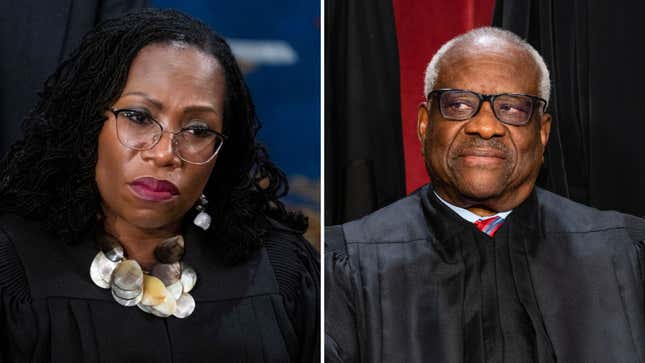Ketanji Brown Jackson Skewers Clarence Thomas in SCOTUS’ Affirmative Action Ruling
"Deeming race irrelevant in law does not make it so in life," Jackson wrote in a blistering dissent, adding some special words for Thomas in a footnote.
JusticePolitics

On Thursday, the Supreme Court voted 6-3 to gut affirmative action programs at universities. The disgraceful majority opinion, authored by Chief Justice John Roberts, said higher education can no longer use race as an explicit factor when admitting students, as it may “involve racial stereotyping.”
Ultraconservative Justice Clarence Thomas used his concurring opinion to lament that affirmative action encourages “permanent victimhood” and claimed that Justice Ketanji Brown Jackson had argued that the legacy of slavery “locks blacks into a seemingly perpetual inferior caste.” (Yes he really said “blacks,” not “Black people.”) Jackson responded in a footnote: “[Thomas] does not dispute any historical or present fact about the origins and continued existence of race-based disparity (nor could he), yet is somehow persuaded that these realities have no bearing on a fair assessment of ‘individual achievement.’” Jackson also wrote that Thomas “ignites too many more straw men to list, or fully extinguish, here.”
Jackson had some words for the majority opinion, too. She wrote: “With let-them-eat-cake obliviousness, today, the majority pulls the ripcord and announces ‘colorblindness for all’ by legal fiat. But deeming race irrelevant in law does not make it so in life.”
In his opinion, Roberts tried to have it both ways by allowing colleges and universities to consider race only when it’s discussed in prospective students’ essays. “Nothing in this opinion should be construed as prohibiting universities from considering an applicant’s discussion of how race affected his or her life, be it through discrimination, inspiration or otherwise. But, despite the dissent’s assertion to the contrary, universities may not simply establish through application essays or other means the regime we hold unlawful today,” he wrote.
-

-

-

-

-

-

-

-

-

-

-

-

-

-

-

-

-

-

-

-

-

-

-

-

-

-

-

-

-

-

-

-

-

-

-

-

-

-

-

-








































